Transport Empire review
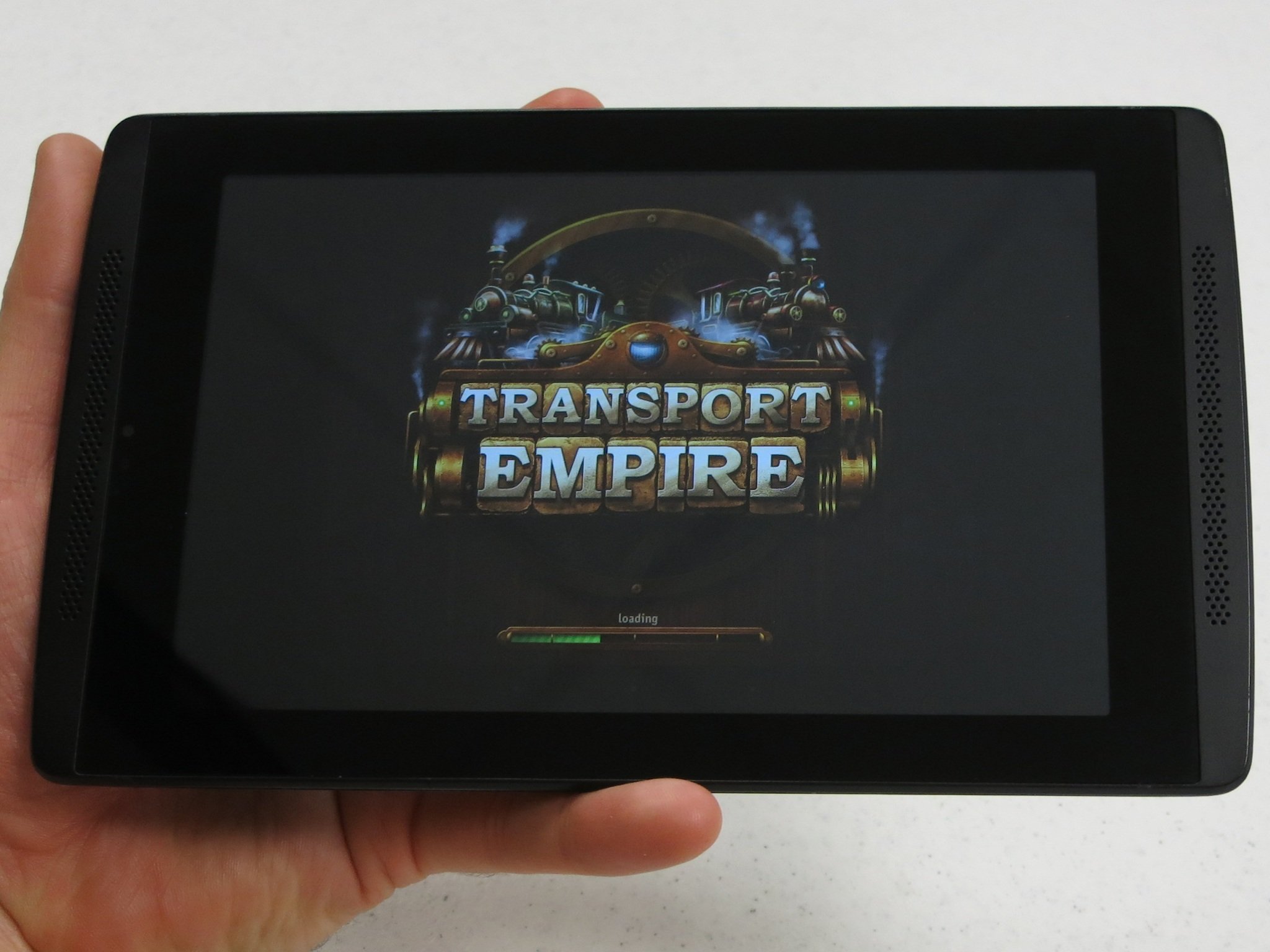
European publisher Game Insight knows a thing or two about city building games. We've covered several of the publisher's genre entries in the past. Each one distinguishes itself by setting and premise most of all, with The Tribez & Castlez having a cheerful fantasy setting and 2020: My Country delving into light science fiction.
Game Insight's latest free to play city builder for Android takes place in the best setting yet, the steampunk era! Players will build a commercial empire spanning across a Victorian land, shipping goods back and forth via train, steamboat, and airship. Watching your trains zoom from city to city proves quite enjoyable, and high quality artwork brings it all to life. Read on for our full impressions with video!
Train in vain
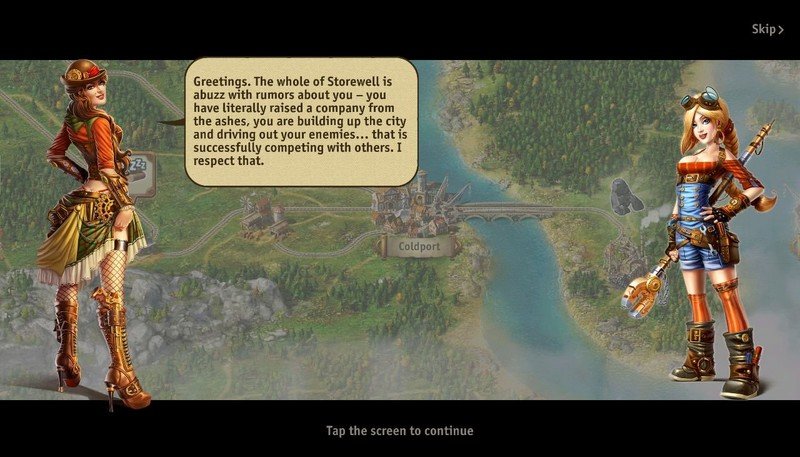
Transport Empire unfolds a little more story than we typically see in city building games. Players take on the role of Lynn Skytell, a young woman who is determined to carve out a business empire of her own in a new land. Along the way she'll interact with her brother, uncle, a rival businessman/suitor, and many more characters. The dialogue is too dry to be of much interest, but the character art is just gorgeous.
Lynn starts out with access to a small portion of land, but she'll unlock new areas as the player levels up. Each location has several places for players to build things, such as mines, lodges, and other buildings. After building or renovating these locations, they'll start producing resources like coal, wood, and iron. These provide the ingredients needed to build new structures or send trains, etc. out on jobs. They can also be sold for silver when your warehouses get too full.
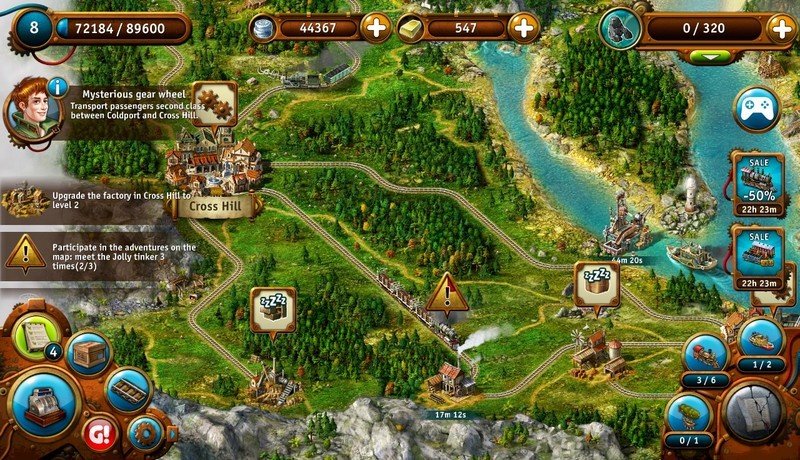
To actually harvest resources, you'll need trains (and later steamboats and airships). The game offers several trains to buy, each based on real-life classical trains. Sending a fleet of trains out and watching them zip along the tracks is actually pretty entertaining, if you like trains. Each run takes a different amount of time to complete, ranging from a minute to several hours. City builders are meant to be played in short spurts throughout the day, after al.
Those trains must also be equipped with carriages to hold passengers or goods. Different carriages are suitable for different resources. If you don't equip the right carriage for a run, the run will take longer or bring back less of the resource (I'm not sure exactly which). But buying a fleet of carriages takes time and money, so some players might just ignore the "inefficient carriage" warning and send the trains out anyway.
Be an expert in 5 minutes
Get the latest news from Android Central, your trusted companion in the world of Android
Cities too
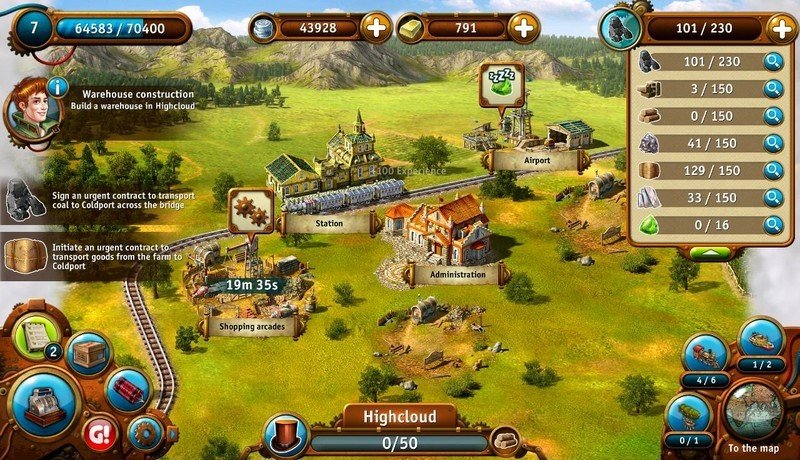
Although you're not tied down to a single sprawling city in this game, cities still come into play. Players will open paths to various cities as the game progresses. These cities are much smaller than the genre norm, with only around 5-7 things to build in each one. One of those, the factory, produces steel. Steel constantly runs dry (annoyingly), so putting the factory to work is really important. Warehouses also provide a necessary storage location for resources.
The cities have their own reputation system that regulates when new upgrades will unlock. Earning a particular resource will fill up a city's reputation meter. Get it up high enough and you can build something new or upgrade an existing structure.
Quests and random events
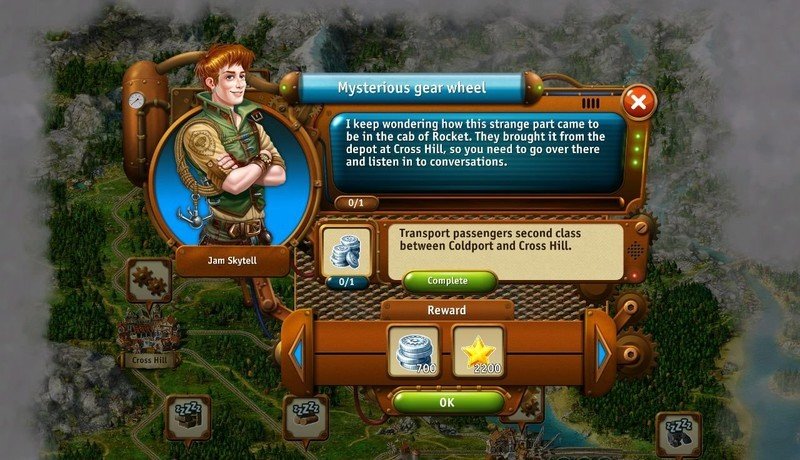
Like any city builder, Transport Empire constantly gives players one or more quests to complete. These add a little to the story, but mainly just keep players busy. You'll have to complete specific types of contracts at different locations, harvest a certain resource, and more. The rewards tend to consist of silver, experience, and sometimes resources.
As your trains and ships move across the map, they'll sometimes encounter a random event. You might need to clear trees from a track, help a traveler in need, or even just take advantage of a fishing opportunity. Accepting a random event always costs either silver or a resource, but it usually pays off with something valuable. Sometimes the vent is a bust and you lose whatever you spent though.
Random events are designated by exclamation marks on the map. If you don't select one quickly enough, it disappears. The system encourages players to stay with the game and pay attention to it for a while rather than just checking in and leaving.
Empire map
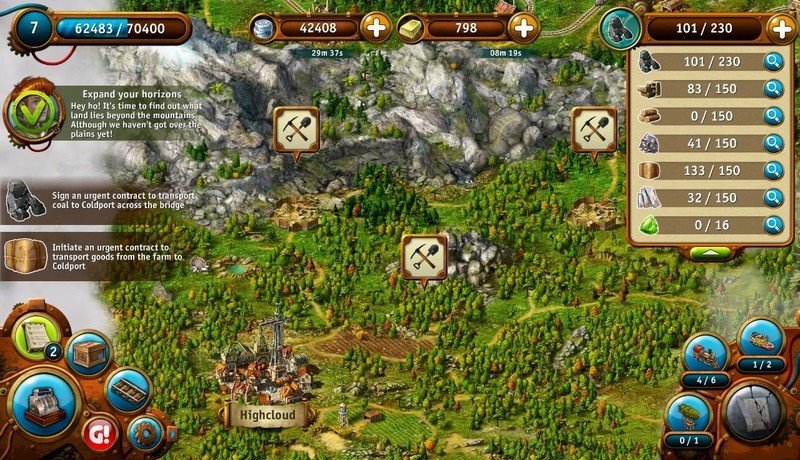
The game map where you'll spend most of your time is colorful and finely drawn, retaining a satisfying amount of detail even when fully zoomed in. It needs some animation beyond player vehicles though, such as water movement or swaying trees.
Although the map screen is mostly well laid out, it does suffer from a UI issue. The quests that players receive all pop up along the left side of the screen. Frequently players will need to tap buildings, random encounters, and other map elements along that same side.
Far too often the game misinterprets my map taps as me selecting a quest, making it tough to collect resources or do whatever I intended to do. You can hide some of the quests by tapping the clipboard icon, but the main quest will remain to block whatever might be behind it. Allowing players to scroll the map farther over so that the intended object would no longer be under the quest description would be the best solution.
Currencies and In-app purchases
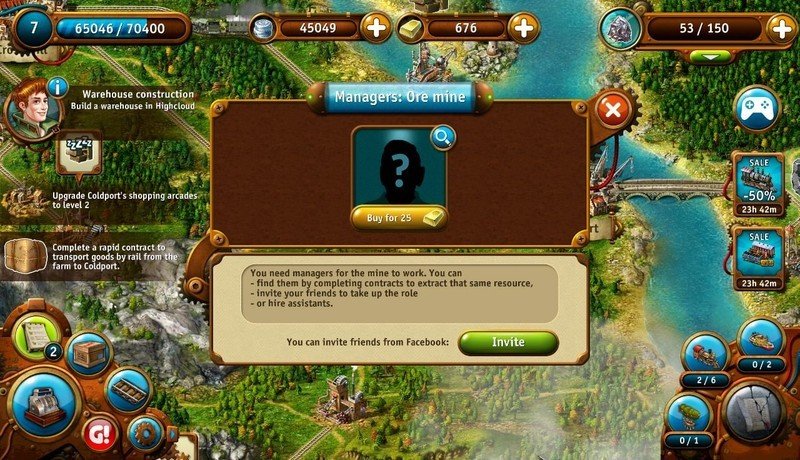
Transport Empire's soft currency is silver. You'll constantly earn silver from completing quests, collecting it from buildings, and other tasks. Every job you take costs some silver, and usually another resource too.
Many trains, carriages, and other important items can be purchased with silver. But the best ones cost gold, the premium currency. Players never need premium vehicles, but they provide advantages like better reliability (less need for repair) and cargo capacity.
Traditionally, gold would be the sole resource for speeding up tasks like jobs and building upgrades. The cost of speed-ups in Transport Empire varies by the actual task, though. Some things cost gold to zip through while others cost silver or resources instead. That's a plus in my book.
The game does have a random drop mechanic that encourages players to spend gold, however. See, new structures on the map such as mines often require a manager before they start producing resources. You can find these managers as random drops when you perform jobs involving that resource, such as finding the logging site manager while collecting logs. Alternately, you can invite a friend from Facebook to fill the position.
The final option is to hire a manager for 25 gold. Players who are determined not to make in-app purchases can probably get by without reaching for their wallets, but it might take a while to grind for managerial drops. Having a few Facebook friends who like this type of game and would be willing to pitch in would certainly provide an advantage.
Building an empire
Transport Empire is one of the most distinctive city building games in Game Insight's oeuvre. Most of the time these games are aimed at women, but this one's sexualized character art (which I enjoy!) and focus on trains indicate a game designed for the boys. If building a fleet of trains and watching them travel across the map sounds like a good time, you'll definitely want to give Transport Empire a try.

